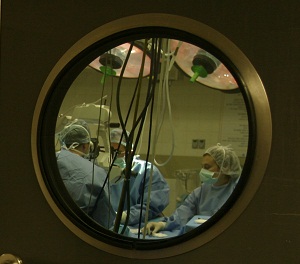
Hadassah Medical Center surgeons recently performed a gastroenterological surgical procedure using the POEM (Per-Oral Endoscopic Myotomy) method, which does not involve incisions. The surgery was aimed at treating a condition called achalasia, which compromises the ability of the esophagus to move food down to the stomach. The results may be backflow of food (regurgitation), chest pain, difficulty in swallowing, and heartburn.
Traditionally, surgeons employ laparoscopy or a surgical robot when operating on this problem. With the POEM method, the surgeon inserts an endoscope through the patient’s mouth into the esophagus and makes a cut in the annular muscle of the esophagus. This relieves the pressure on the esophagus, allowing the food to pass down freely to the stomach.
“This is one of the procedures that will change general surgery completely and our department plays a key role in this process,” says Dr. Yoav Mintz, who performed the procedure at Hadassah with his colleagues from the gastroenterology department. “Although the patient was operated on under full anesthesia, she wanted to go home that same night. I had to keep her almost by force for another 48 hours,” he adds smiling.
Dr. Mintz was the successful finalist in an international competition for a two-year fellowship at the University of California, San Diego (UCSD), where he worked with Prof. Mark Talmini and Prof. Santiago Horgan, world leaders in minimally invasive surgery and robotic surgery. When he completed his fellowship, he returned to Hadassah to implement the new techniques and vision. He continues to collaborate with his colleagues at UCSD, also serving as Assistant Clinical Professor in the Department of Surgery there.
